*NURSING > DISCUSSION POST > NR 554 - POLITICS OF SCIENCE POLICY- DOWNLOAD TO SCORE AN A (All)
NR 554 - POLITICS OF SCIENCE POLICY- DOWNLOAD TO SCORE AN A
Document Content and Description Below
Chamberlain College of Nursing NR 554: Nurse Leader and Healthcare Policy March 2018 Identify a current or previously funded National Institute of Nursing Research (NINR) research study and ide... ntify the area of 'determination of need' that this research study addresses. Identify the population that the findings of this research support and list several potential outcomes and the policy that it would support. What are the key drivers of this issue? Politics of Science Policy Caregiving can be rewarding, but it can also be challenging. Caregiving for an ailing family member can be stressful and overwhelming, thus placing a tremendous toll on the caregivers’ health and well-being. The stress of caring for a vulnerable senior or another person with special needs is a major risk factor for developing numerous chronic conditions. Family caregiving has been associated with increased levels of depression and anxiety, sedentary lifestyle and poor nutrition, social isolation, compromised immune function, and increased mortality (Office of Disease Prevention and Health Promotion, n.d.; Tremont, Davis, Papandonatos, Ott, Fortinsky, Gozalo, Yue, Bryant, Grover, Bishop, 2015). Providing care for individuals with dementia has profound consequences for family caregivers, who may be called upon to manage behavioral disturbances, attend to physical needs, and provide seemingly constant vigilance. Family caregivers of people with dementia are critical to the quality of life of the care recipients. Therefore, there is a need for psychosocial interventions to reduce caregiver burden and depression. Identifying Effective Telephone-Based Intervention on Caregiver Well-being The National Institute of Nursing Research (NINR) research study identified in this discussion examines the effects of a telephone-based intervention on caregiver well-being. Telephone-based interventions have been successfully used to improve functioning in individuals with a variety of clinical problems, including chronic diseases, postoperative care, and lifestyle change (Tremont et al., 2015). The study design utilized was a randomized controlled trial with 250 distressed, family, dementia caregivers. Randomized caregivers received 16 telephone contacts over 6 months of either the Family Intervention: Telephone Tracking–Caregiver (FITT- C) or Telephone Support (TS). The FITT-C focused on “providing dementia education, emotional support, directing caregivers to appropriate resources, encouraging caregivers to attend to their physical, emotional, and social needs, and teaching caregivers’ strategies to cope with ongoing problems” (Tremont et al., 2015). The primary goal of the control condition, telephone support (TS), was to provide non-directive support for caregivers through empathic and reflective listening and open-ended questioning (Tremont et al, 2015). Results of the study showed that telephone-based interventions are convenient and accessible for busy caregivers and are less costly than in-office or home-based interventions due to no travel costs. Telephone-based intervention FITT-C resulted in reduced depression and reactions to care recipient’s behavior problems in stressed dementia caregivers. Determination of Need The determination of needs identified for this study includes health promotion, risk reduction, and emphasis on individuals and families. Research indicates that caregivers may put their own health and well-being at risk while assisting loved ones. Stress can play a significant role in the physical and mental health of caregivers. Chronic stress leads to psychological distress and too risky health behaviors (e.g., substance abuse, poor nutrition, sedentary lifestyle) that are often associated with physical and mental health problems. Caregiver health promotion should focus on changing health behaviors that enhance caregiver well-being. The World Health Organization defines health promotion as the process of utilizing social and environmental interventions to improve individual behaviors and health (2017). Health-promoting behaviors are active approaches to achieve optimal health, reduce the incidence of chronic disease and illness, and achieve a better quality of life. Cognitive and behavioral strategies may help the caregiver in regulating his or her coping behaviors during stressful situations. Kemppainen, Tossavainen, & Turunen assert that this concept was created to address social and health policies (2013, p. 490). Comprehensive interventions should focus on education regarding the health risks of caregiving and information related to health promotion and prevention, as well as direct training and engagement in behaviors that can maintain health and prevent disease. Healthcare professionals are well-suited to engage caregivers in health promotion and risk reduction dialogue. Healthcare professionals are in a position to recognize caregivers at risk and guide them to appropriate care and resources. As interventions to address caregiver health are developed and implemented, it is essential that caregivers, care recipients, and the family as a whole be considered and addressed. Public Policies One public policy in the U.S. to address the needs of family caregivers the National Family Caregiver Support Program (NFCSP), which was signed into law in 2000 as part of the Older Americans Act Amendments. This program was established to provide information to caregivers about available services; assist caregivers in gaining access to supportive services; offer individual counseling, organization of support groups, and caregiver training; provide respite care for temporary relief from caregiving responsibilities; and assist with supplemental services to complement the care provided by caregivers (Administration on Aging, 2004). Eligible individuals are family caregivers who provide care for individuals age 60 or older and family caregivers who provide care for individuals with Alzheimer’s disease and related disorders, regardless of age. There is much work to be done in the advocacy arena at the local, state, and federal levels to address the growing needs of family caregivers. Future objectives in caregiving policy must include collaboration among caregivers, care recipients, advocacy organizations, health care providers, professional organizations, and local, state, and national organizations to make the physical and psychological health of caregivers a national policy priority. References Administration on Aging. (2004). About NFCSP. Retrieved from http://www.aoa.gov/prof/aoaprog/caregiver/overview/overview_caregiver.asp. Asrami, F. S., Hamzehgardeshi, Z., & Shahhosseini, Z. (2016). Health promoting lifestyle behaviors in menopausal women: A cross-sectional study. Global Journal of Health Science, 8(8), 128-134. doi:10.5539/gjhs.v8n8p128 Kemppainen, V., Tossavainen, K., & Turunen, H. (2013). Nurses' roles in health promotion practice: an integrative review. Health Promotion International, 28(4), 490-501. doi:heapro/das03 Office of Disease Prevention and Health Promotion. (n.d.). Health People 2020. Older Adults. Retrieved from https://www.healthypeople.gov/2020/topics-objectives/topic/older-adults Tremont, G., Davis, J. D., Papandonatos, G. D., Ott, B. R., Fortinsky, R. H., Gozalo, P., Yue, M.S., Bryant, K., Grover, C., Bishop, D. S. (2015). Psychosocial telephone intervention for dementia caregivers: A randomized, controlled trial. Alzheimer’s & Dementia: The Journal of the Alzheimer’s Association, 11(5), 541–548. http://doi.org/10.1016/j.jalz.2014.05.1752. World Health Organization. (2017). Health promotion. Retrieved from http://www.who.int/topics/health_promotion/en/ Professor Response to Post: Thank you Carole, We are caring for my mother with a live-in care giver, but still there is stress. I understand how hard it is for those without respite. If you were to decide, what community services will you provide for eligible individuals family caregivers who provide care for individuals with Alzheimer’s disease, regardless of age? Response to Professor: Dr. Fildes, Until recently, my husband’s and I cared for my 91-year-old mother-in-law with Alzheimer’s for 7 years. In December, she was stricken with the flu and her memory has declined since then. Therefore, in January we had to make the hard decision to place in her a memory care unit in a skilled nursing facility. Now, I’m caring for my 72-year-old mother who was recently diagnosed with liver disease earlier this month. Fortunately, she is still able to live on her own with some assistance (e.g. grocery shopping, cleaning the house, laundry, and running errands). I recently read that more than half of family caregivers provide 8 hours of care or more every week, and one in five provides more than 40 hours per week. This is so true in my experience, if not more. Unfortunately, family caregivers get very little help from healthcare professionals in managing their tasks and the emotional demands of caregiving. Regardless of the amount of care provided, caregivers may become increasingly more distressed if they are unable to participate in valued activities and interests. Healthcare professionals must begin to view caregivers as hidden patients themselves; thus, offering comprehensive counseling sessions for spouses caring for a person with dementia to help reduce stress, depression, and anxiety. Teaching caregivers how to manage specific patient problems can improve the caregiver’s well-being. Family caregivers may not know when they need community resources and they may not know how to access and best utilize available resources. The National Area Agencies on Aging (AAAs), senior centers, or community mental health programs are good resources that can help caregivers find potential services, such as adult day care programs, respite care, and meals. Carole B. Response to Peer Reply: Sandra, Thank you for your personal story. This past month has been the toughest experience for me becoming a caregiver, maybe because it's my own mother. So, when you made the statement that you saw your mother become someone else, I can definitely relate to her stress and personal experience. Learning to balance family, work, school, and my own personal interest is not an easy task for me to conquer. Once, I was a person that enjoyed exercise and participate in stress- relieving activities. Now, my focus been work, school, and caregiving with my own mental and physical health being put aside. I now have sleep disturbance and fatigue. So, reading these articles has been an eye-opener. For example, today was a nurses Rally to the Hill in Columbus, OH. I was scheduled to go with fellow Cleveland Clinic nurse leaders and my mentor, but today my mother has a scheduled appointment. I was heartbroken when I realized I couldn't go and angry. I'm learning that as a caregiver change requires constant adaptation and adjustment, which translates into adapting to different schedules, changing routines, and accommodating other roles. [Show More]
Last updated: 1 year ago
Preview 1 out of 8 pages
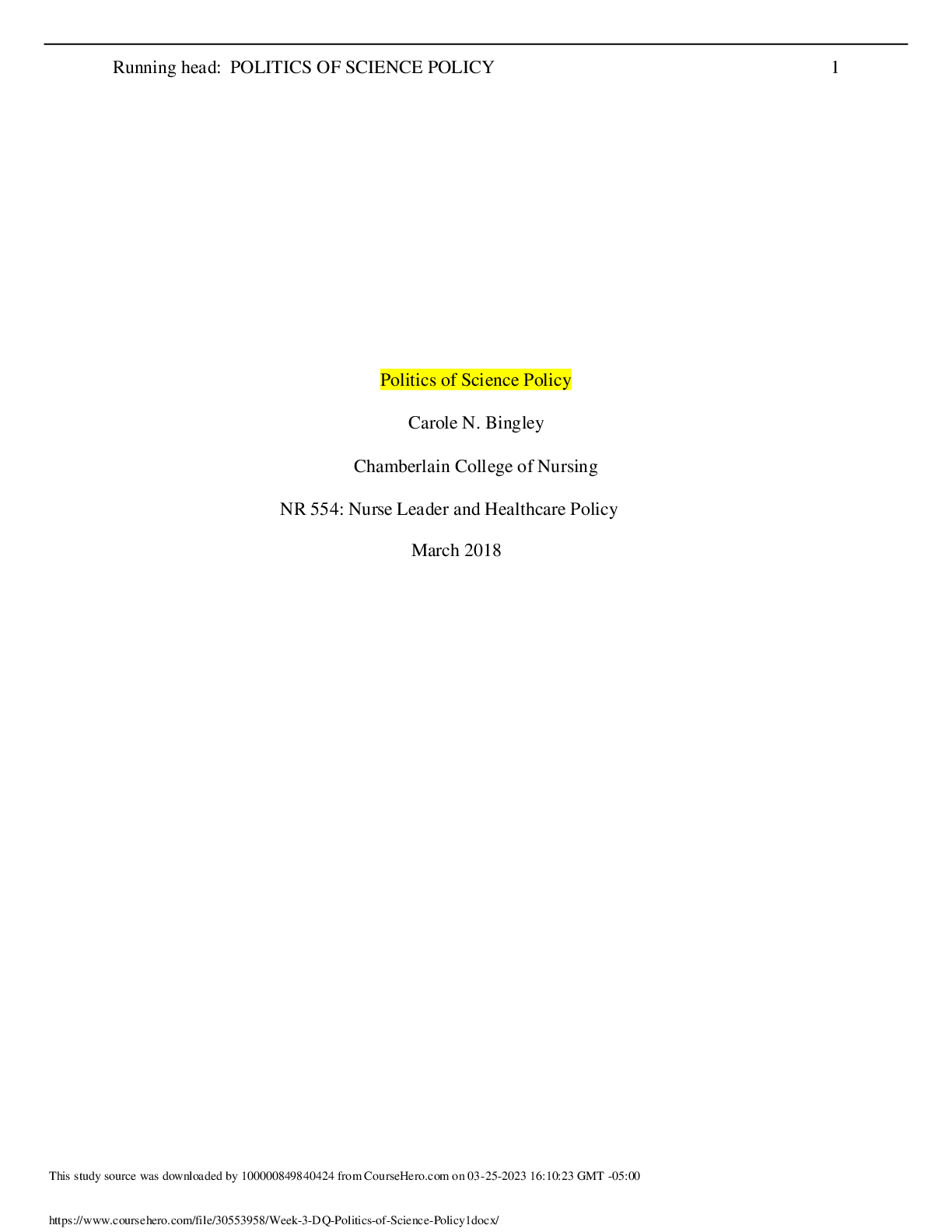
Reviews( 0 )
Document information
Connected school, study & course
About the document
Uploaded On
Mar 26, 2023
Number of pages
8
Written in
Additional information
This document has been written for:
Uploaded
Mar 26, 2023
Downloads
0
Views
71

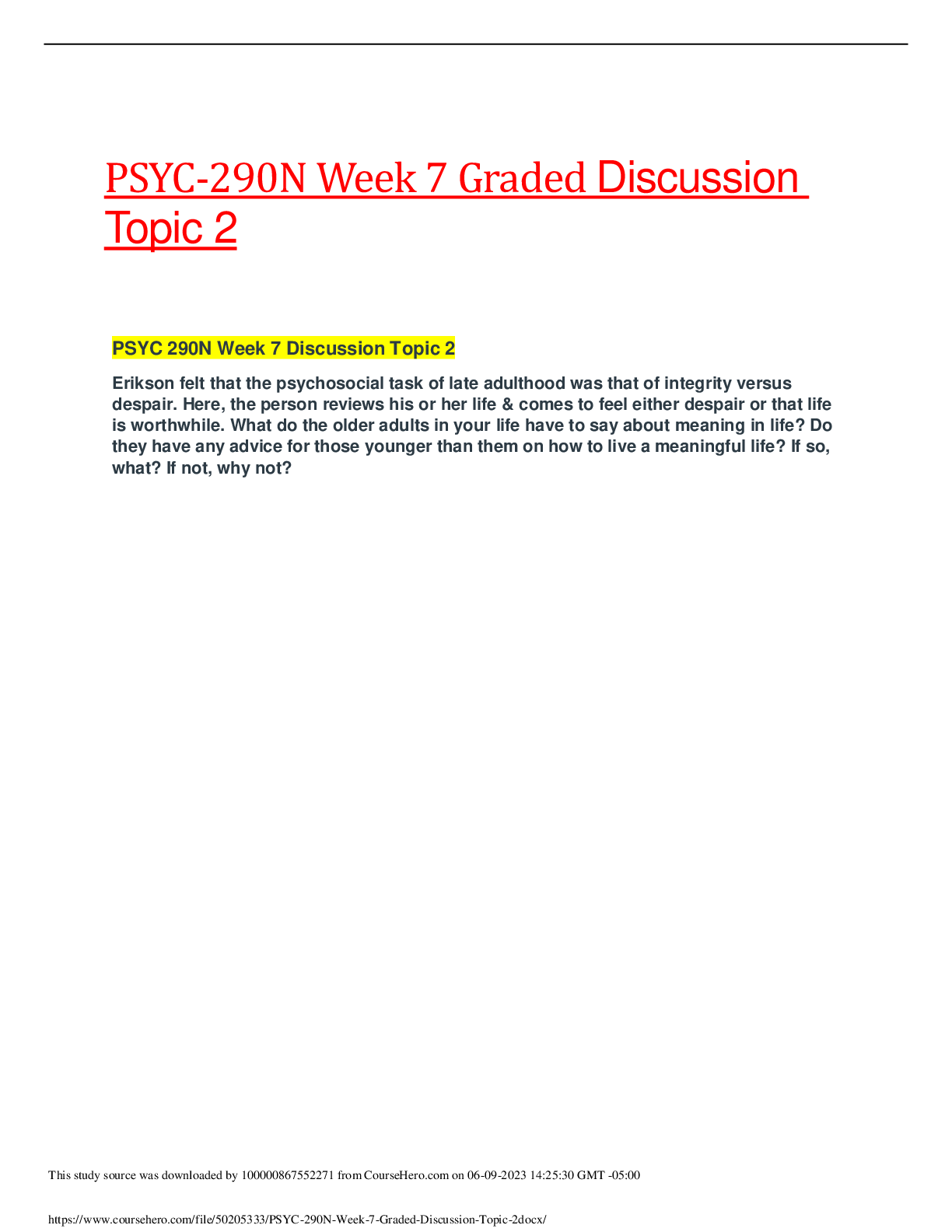
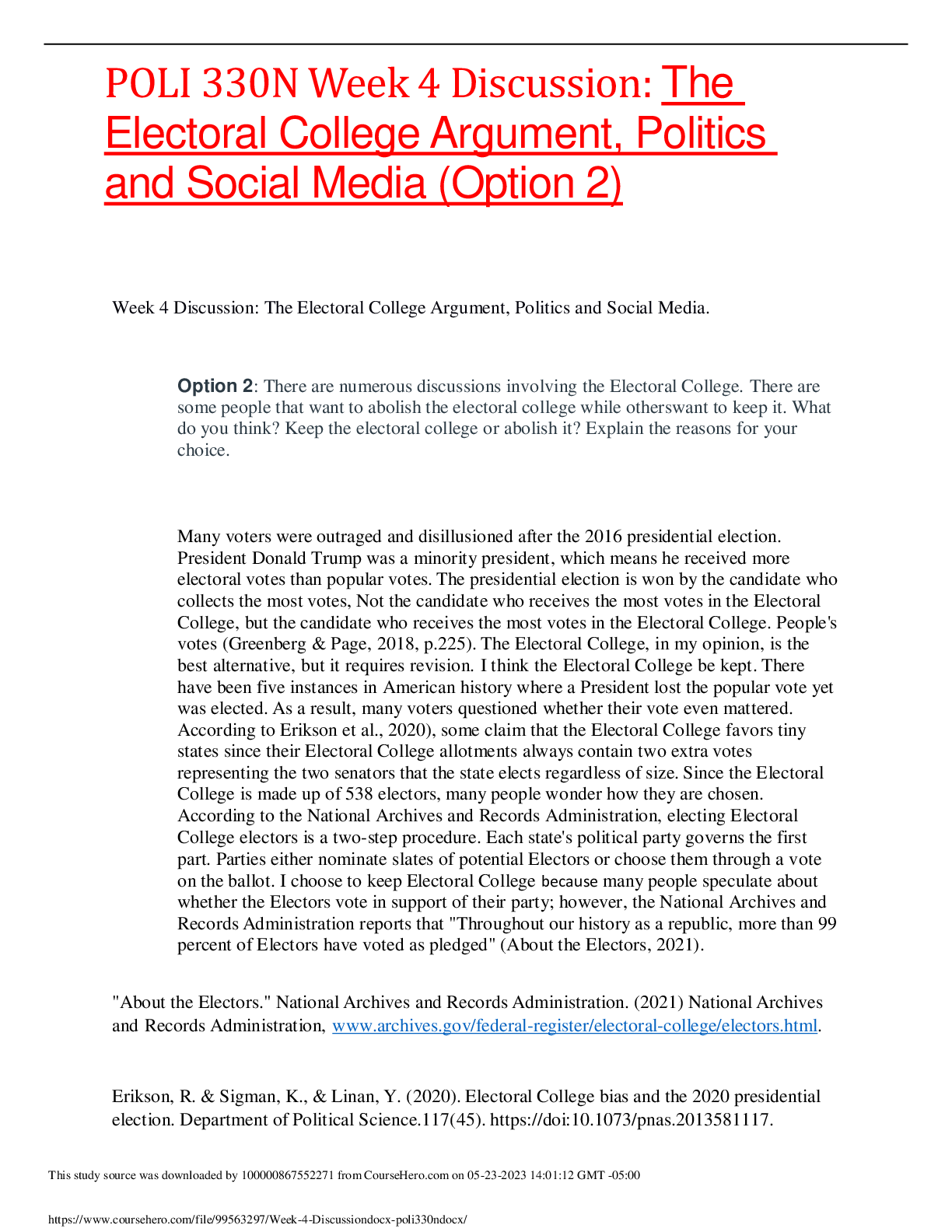
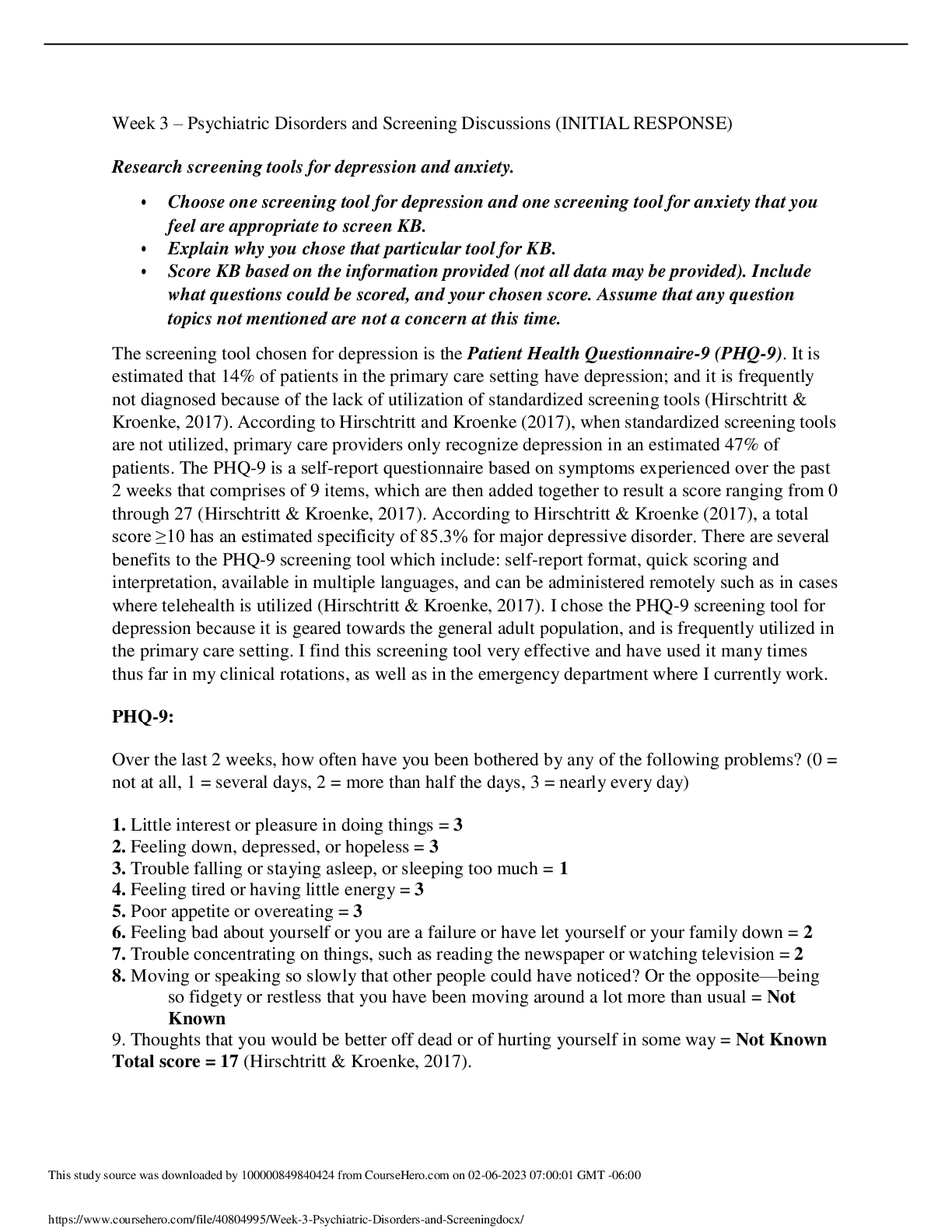
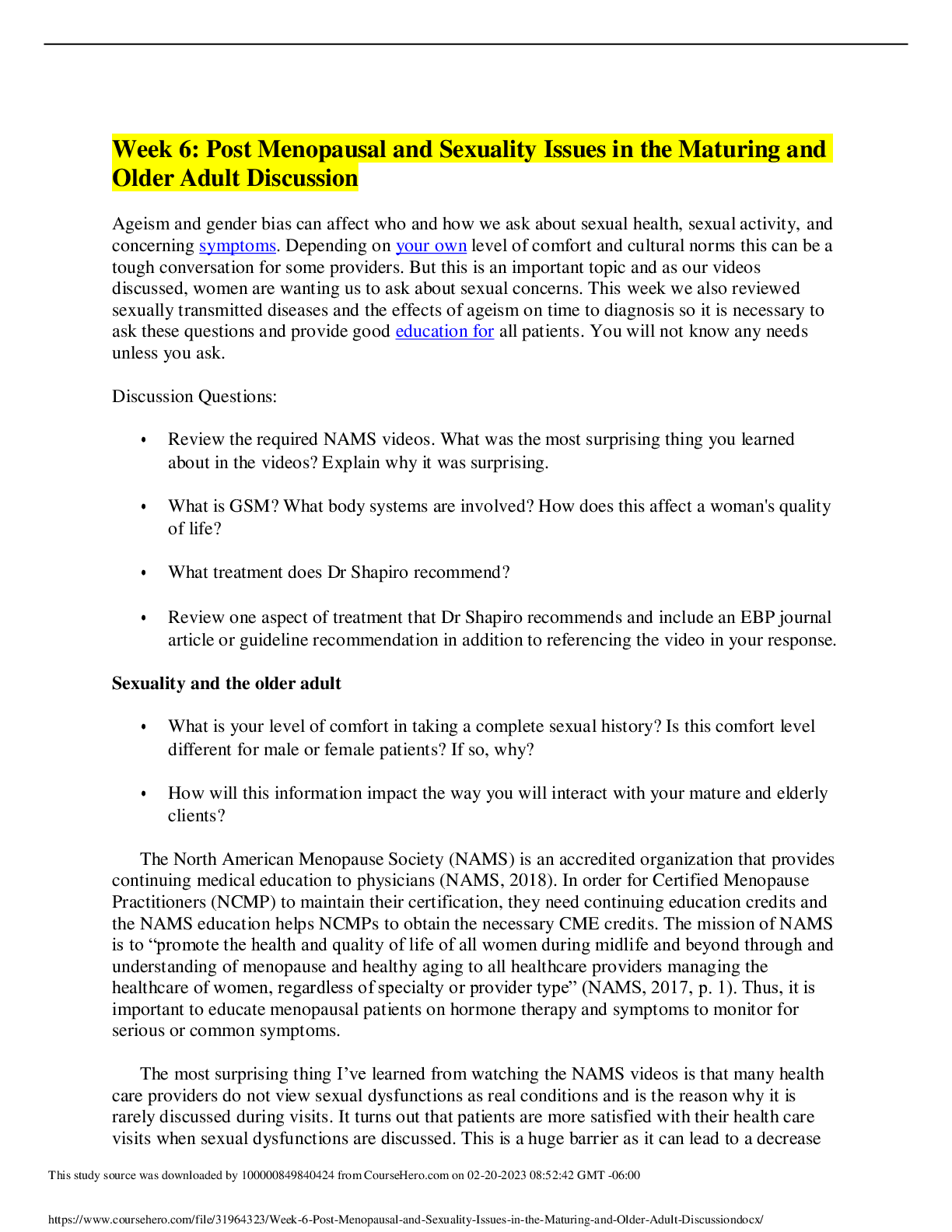
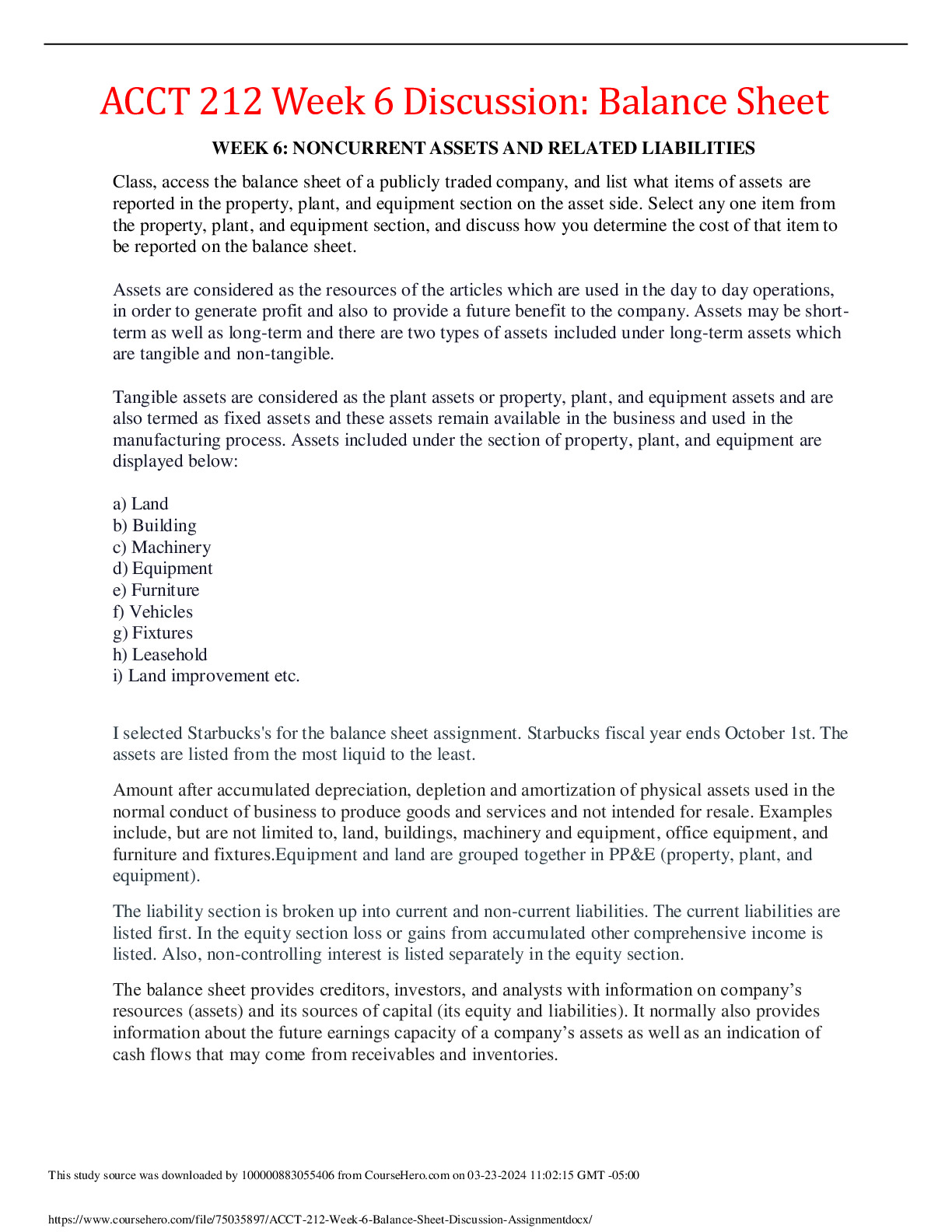
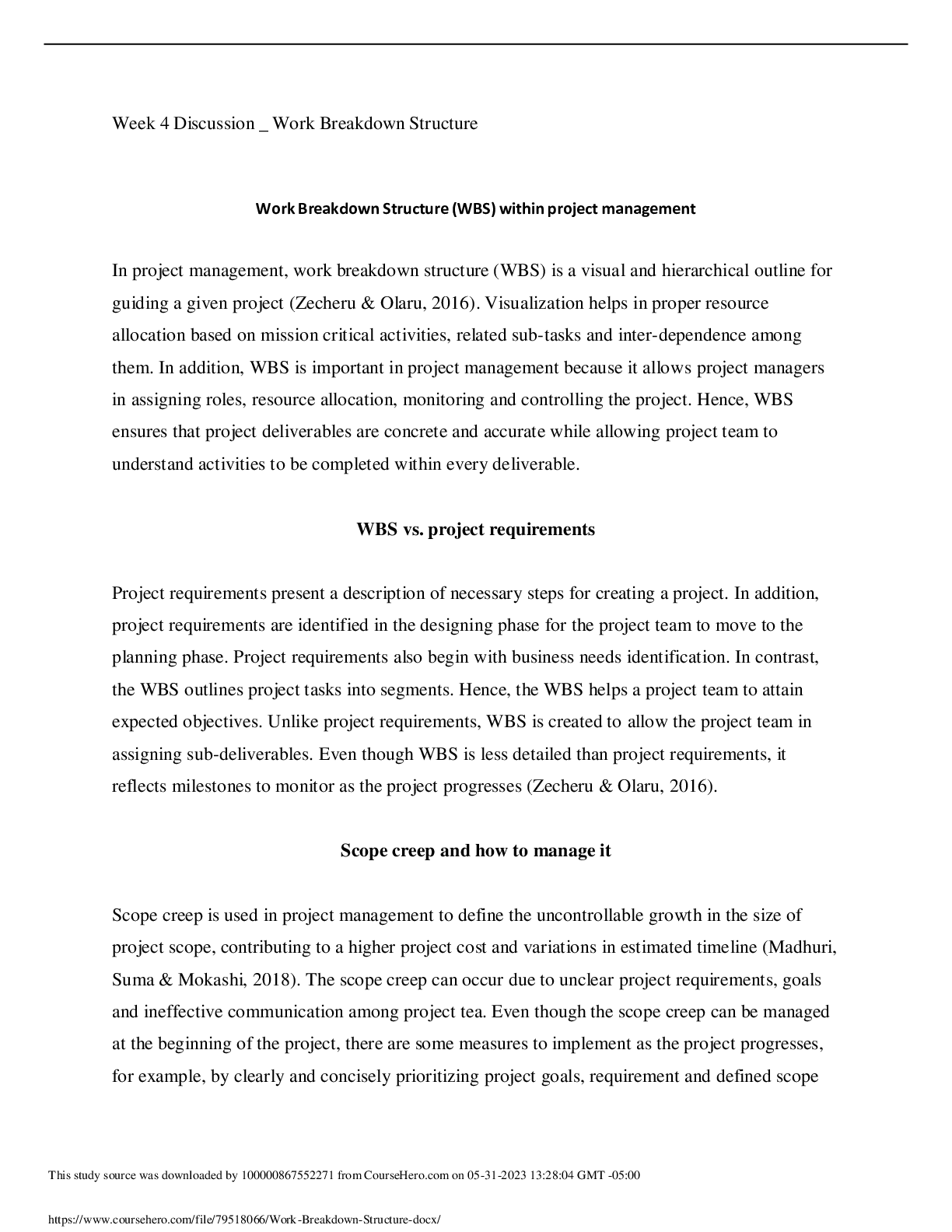
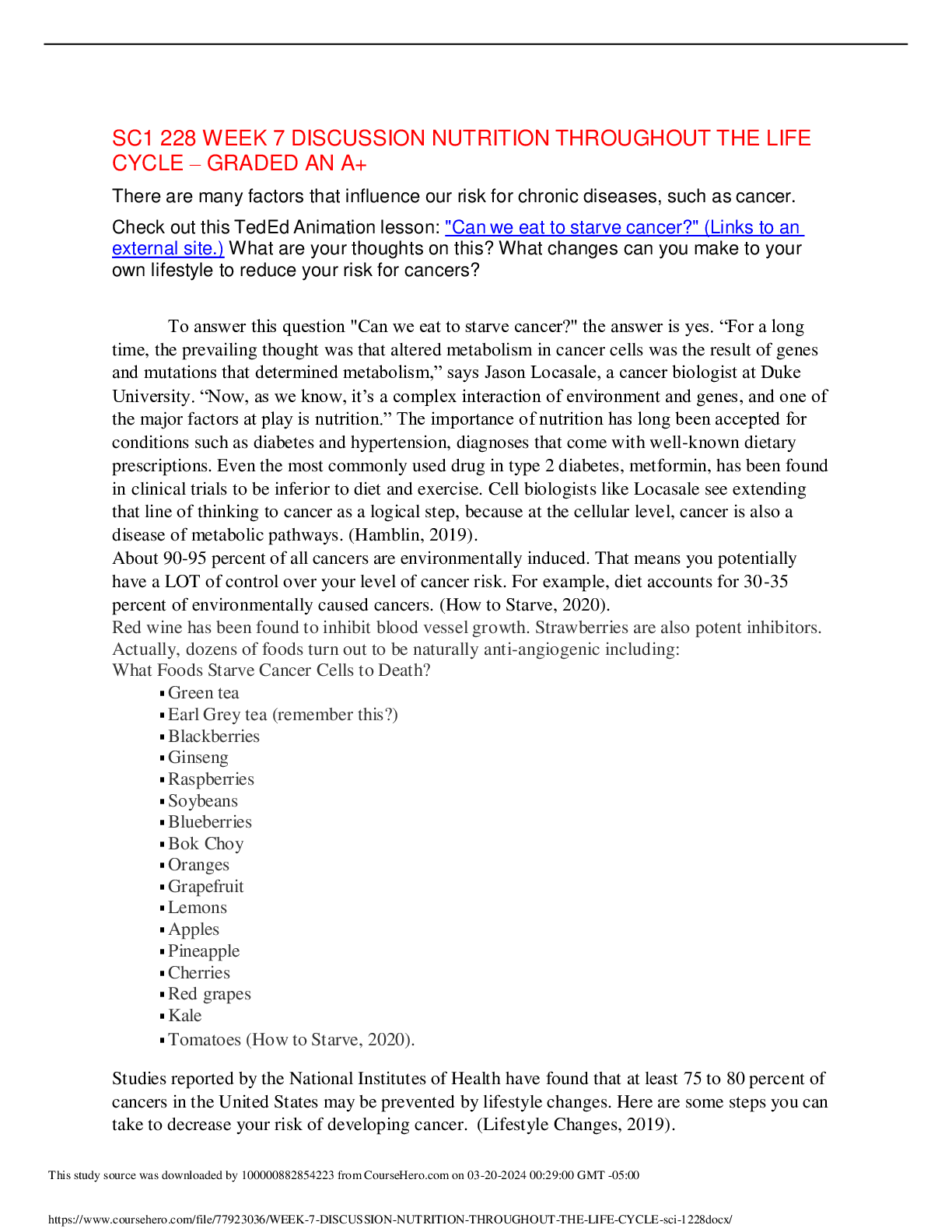

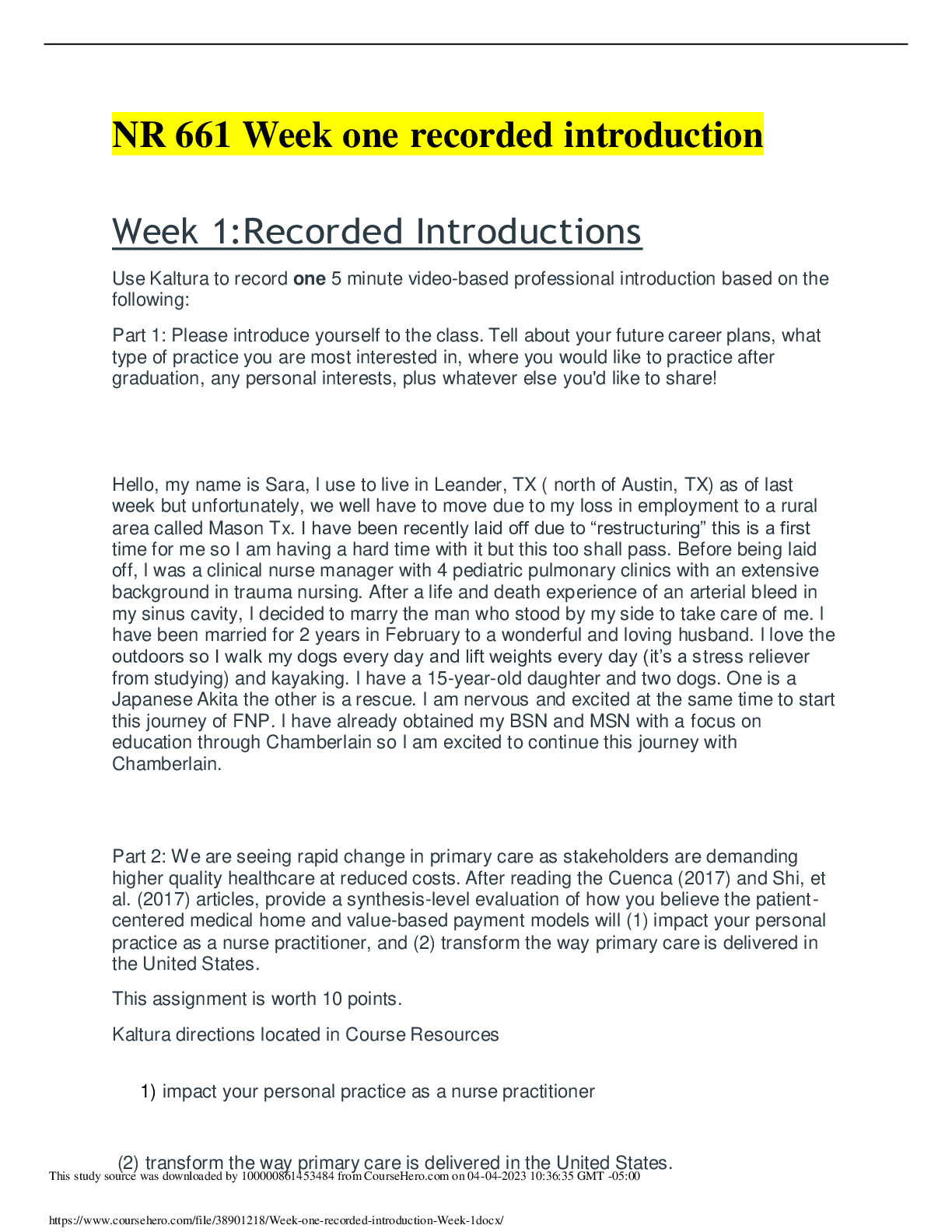

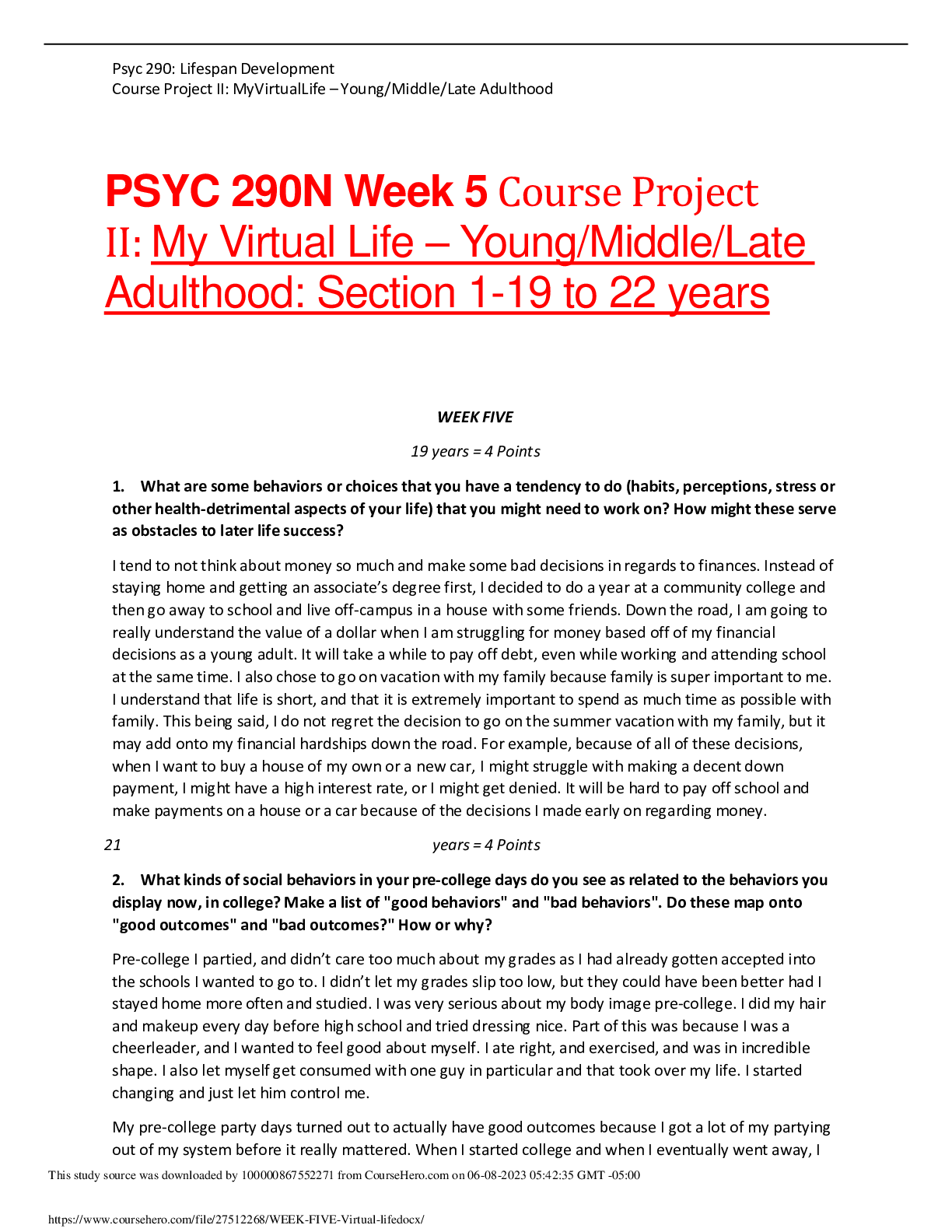

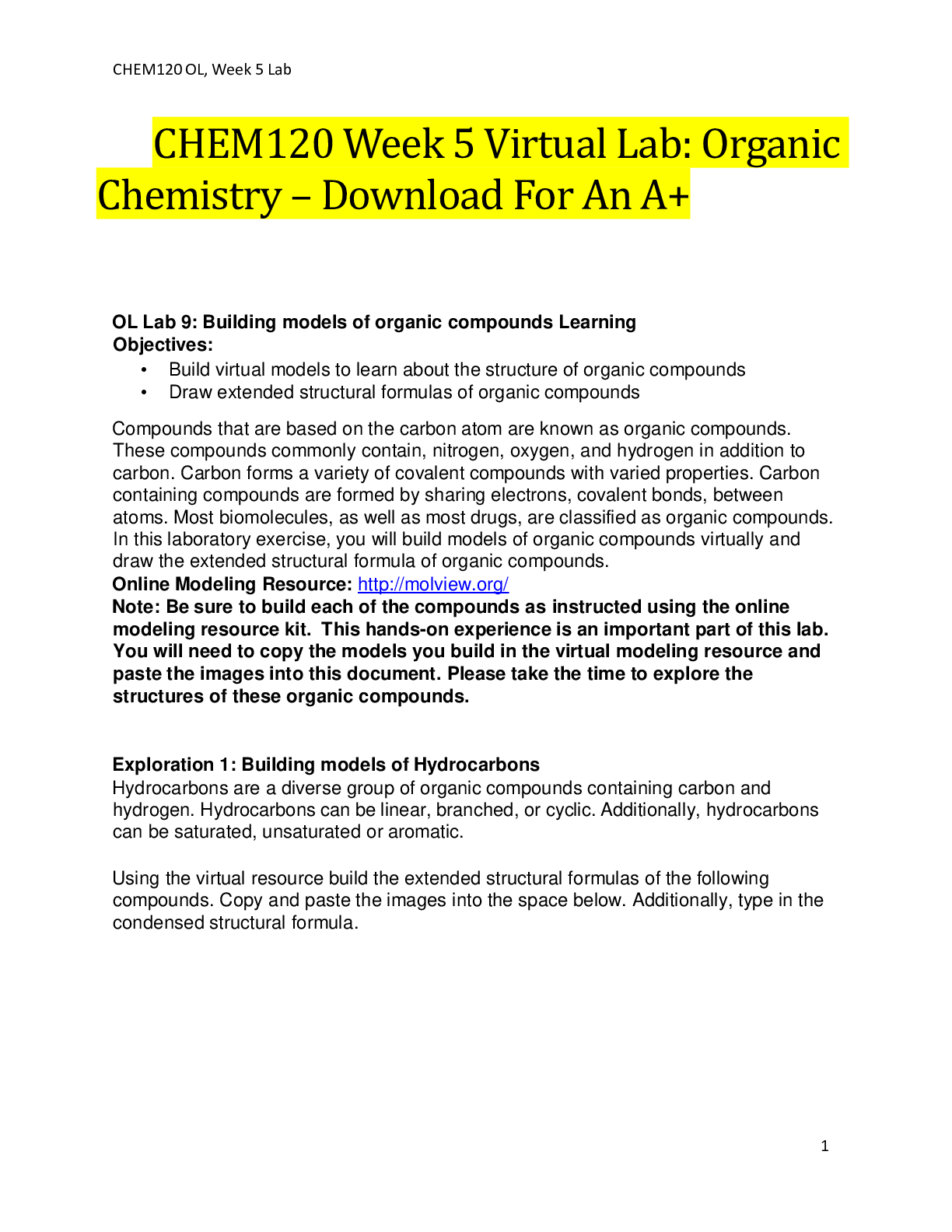
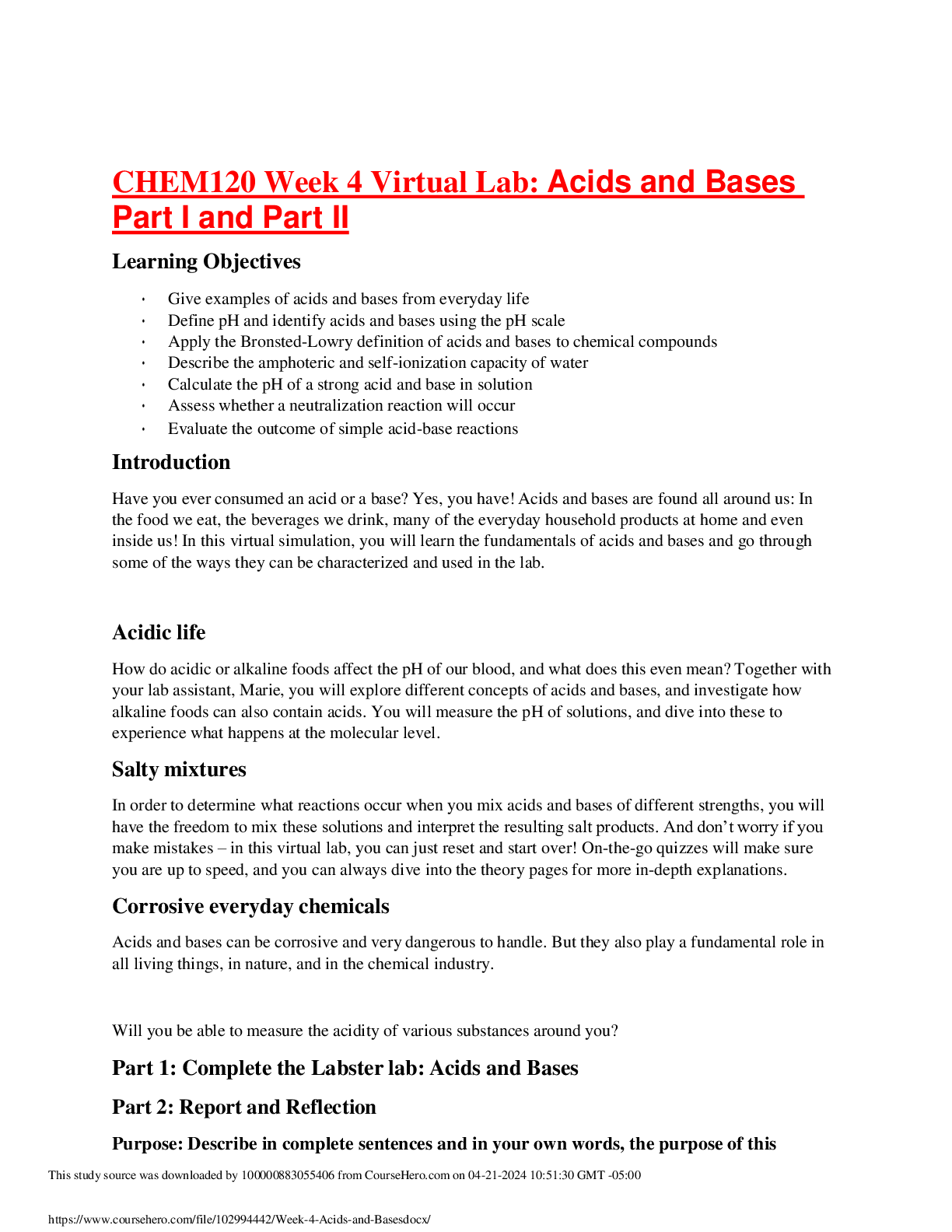


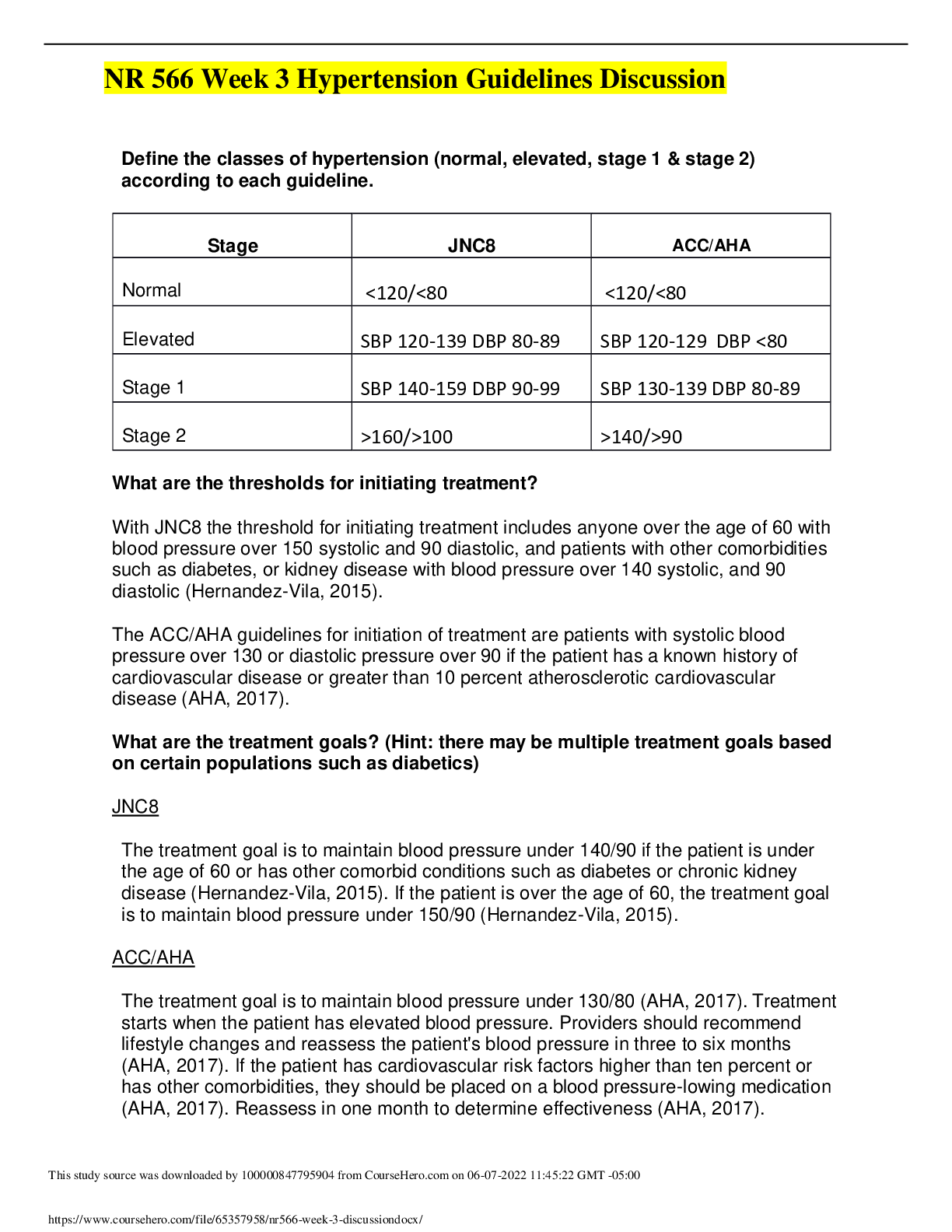
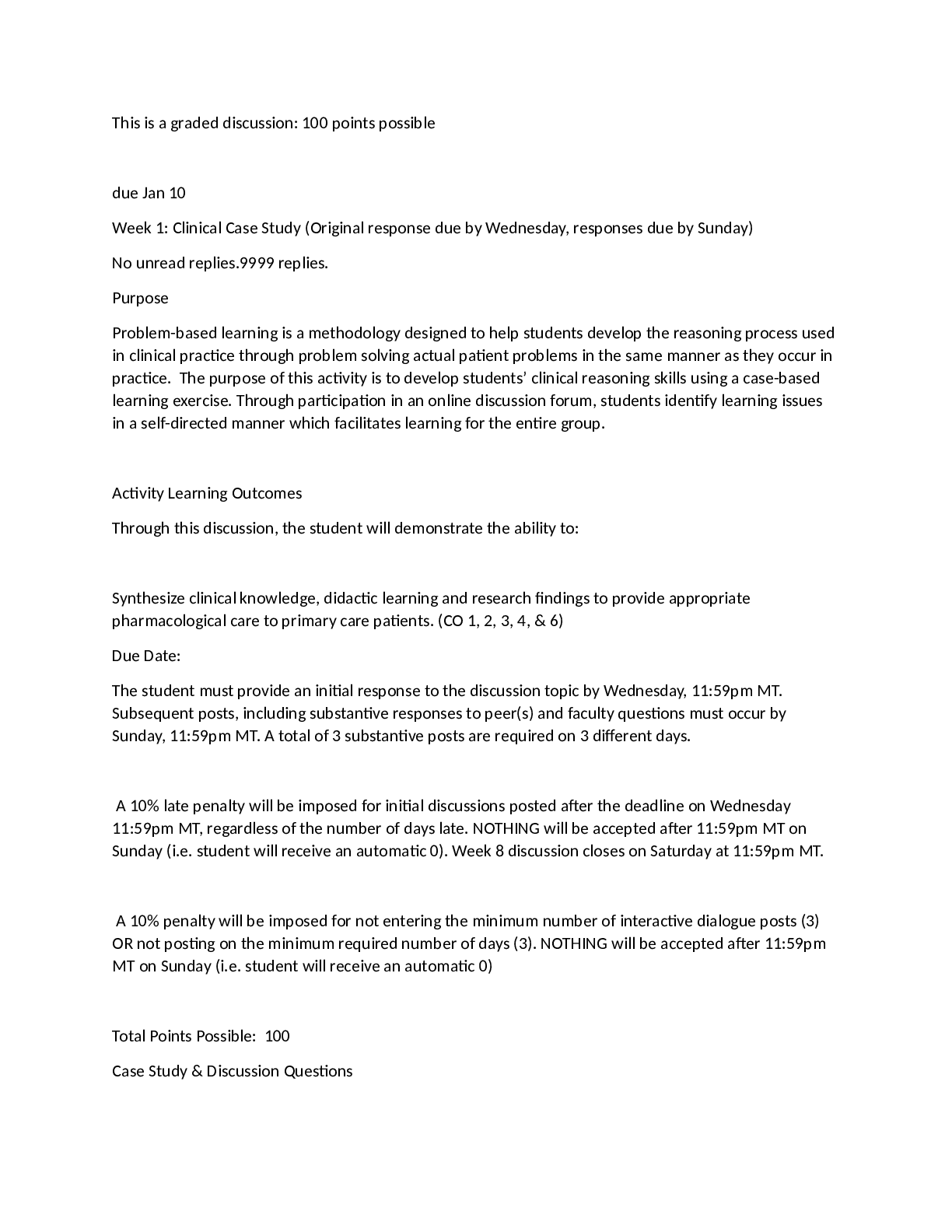
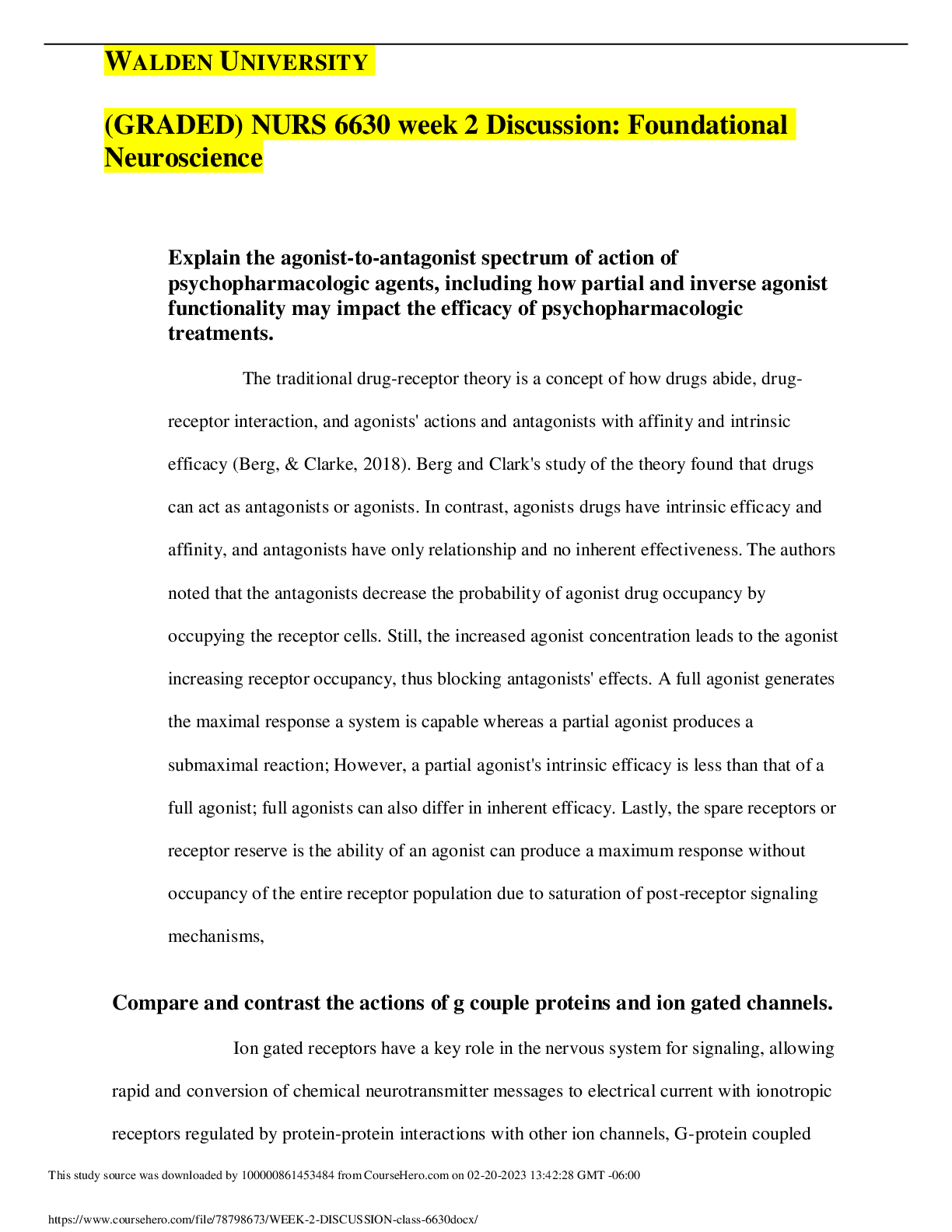
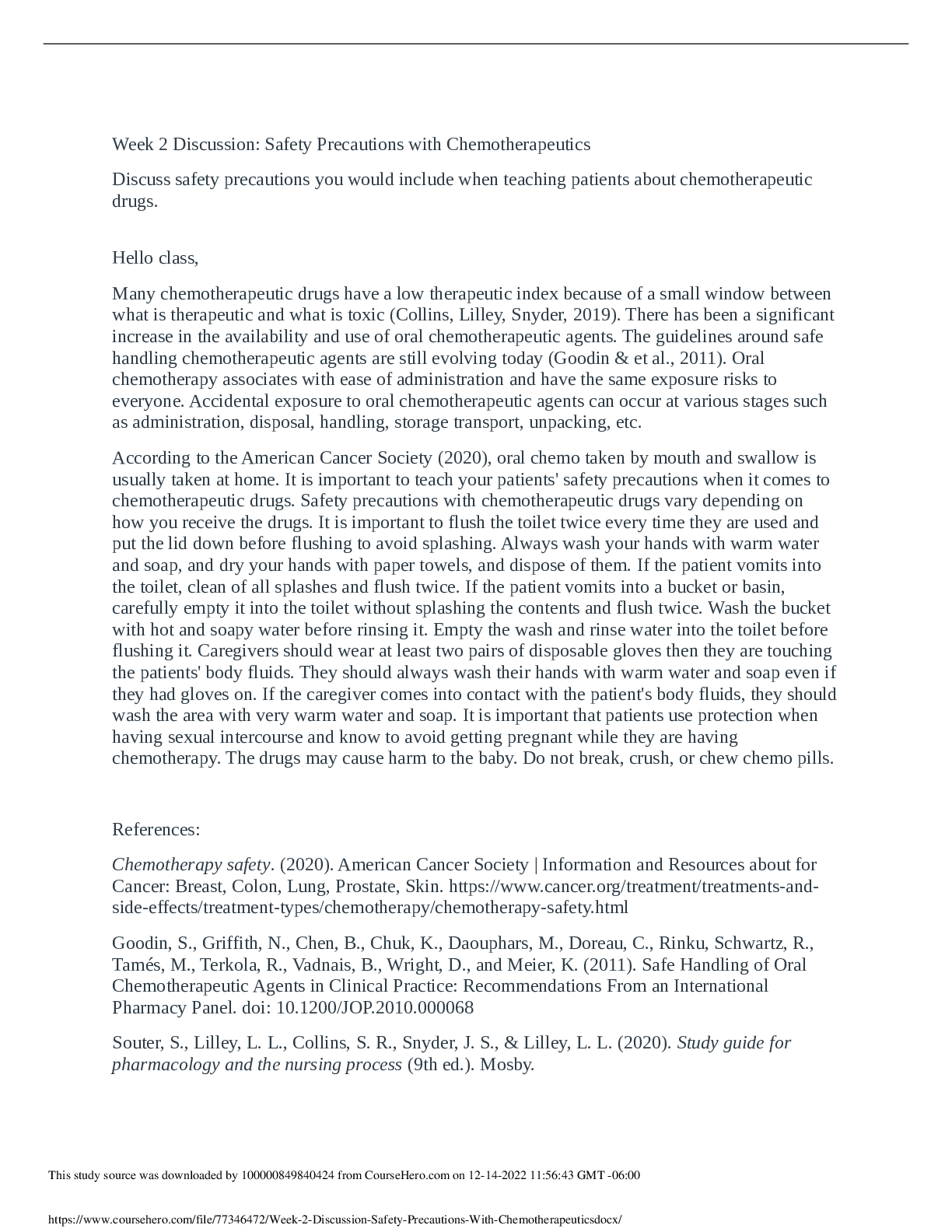
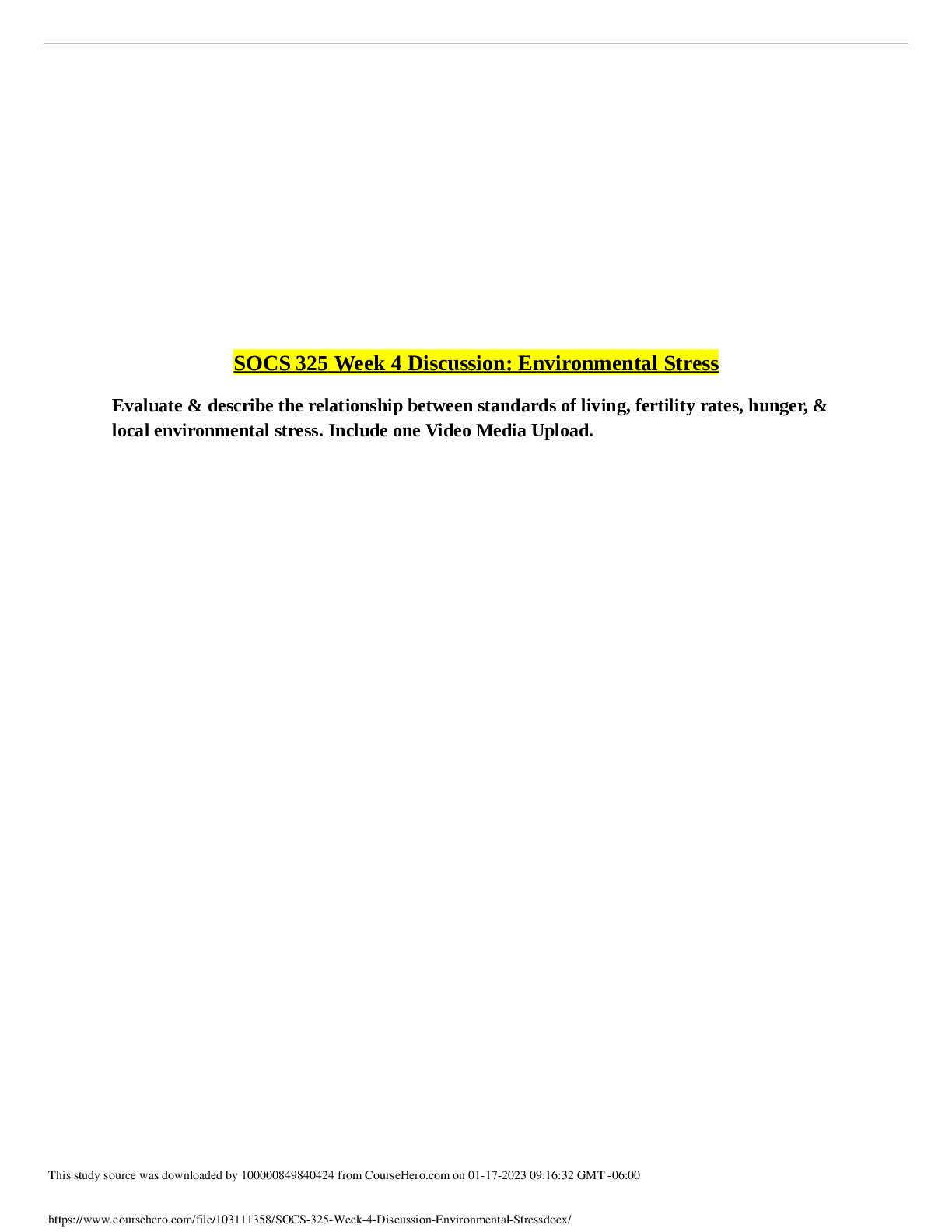
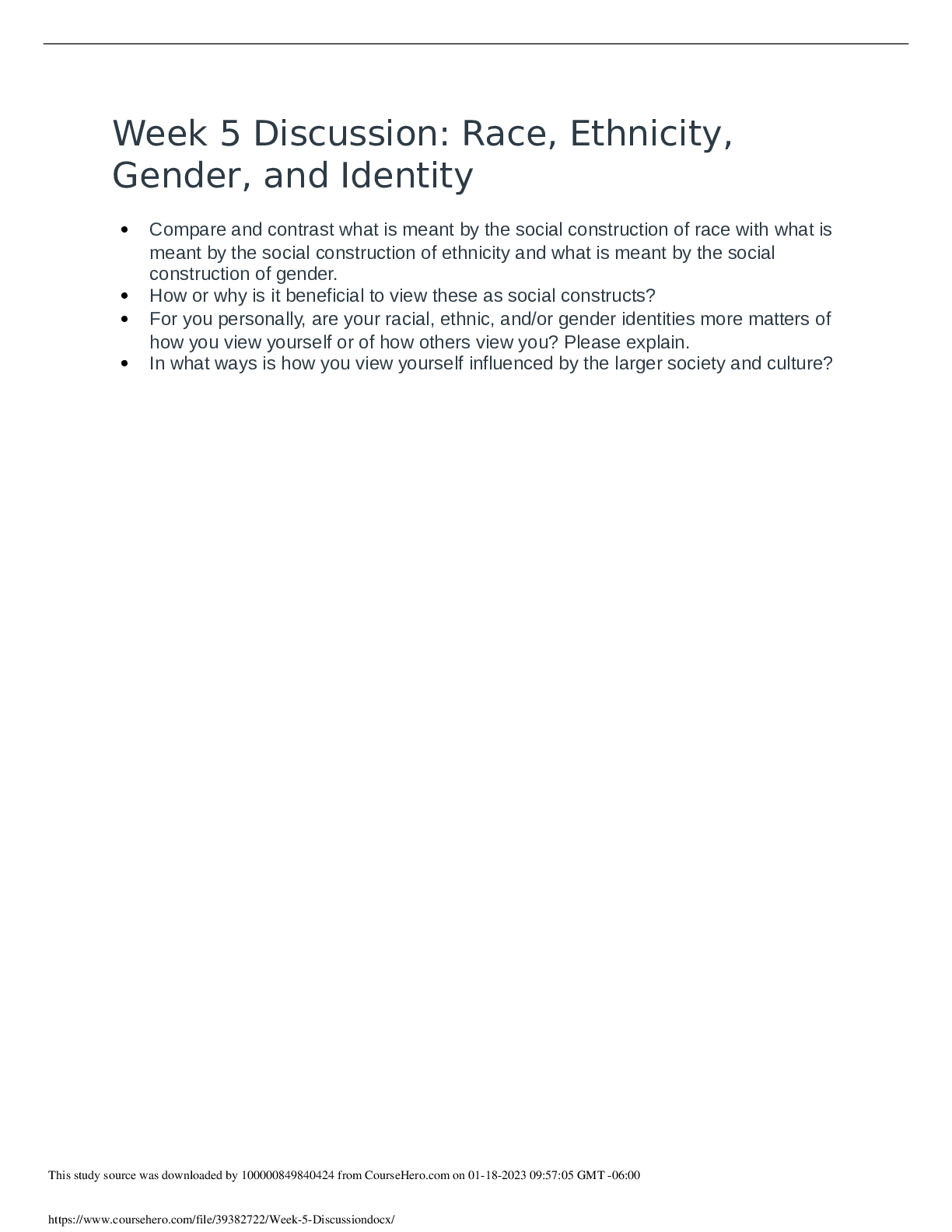

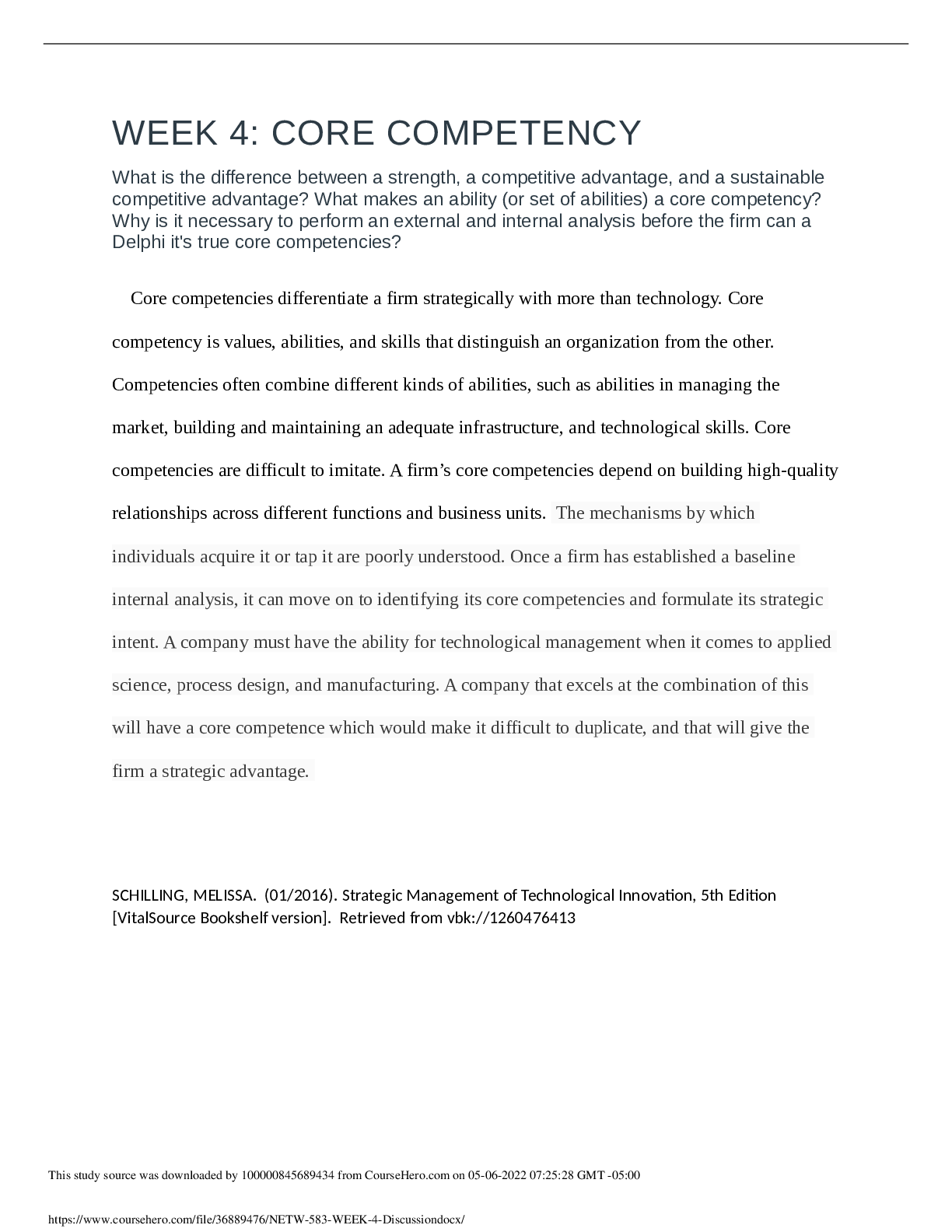
 (1).png)

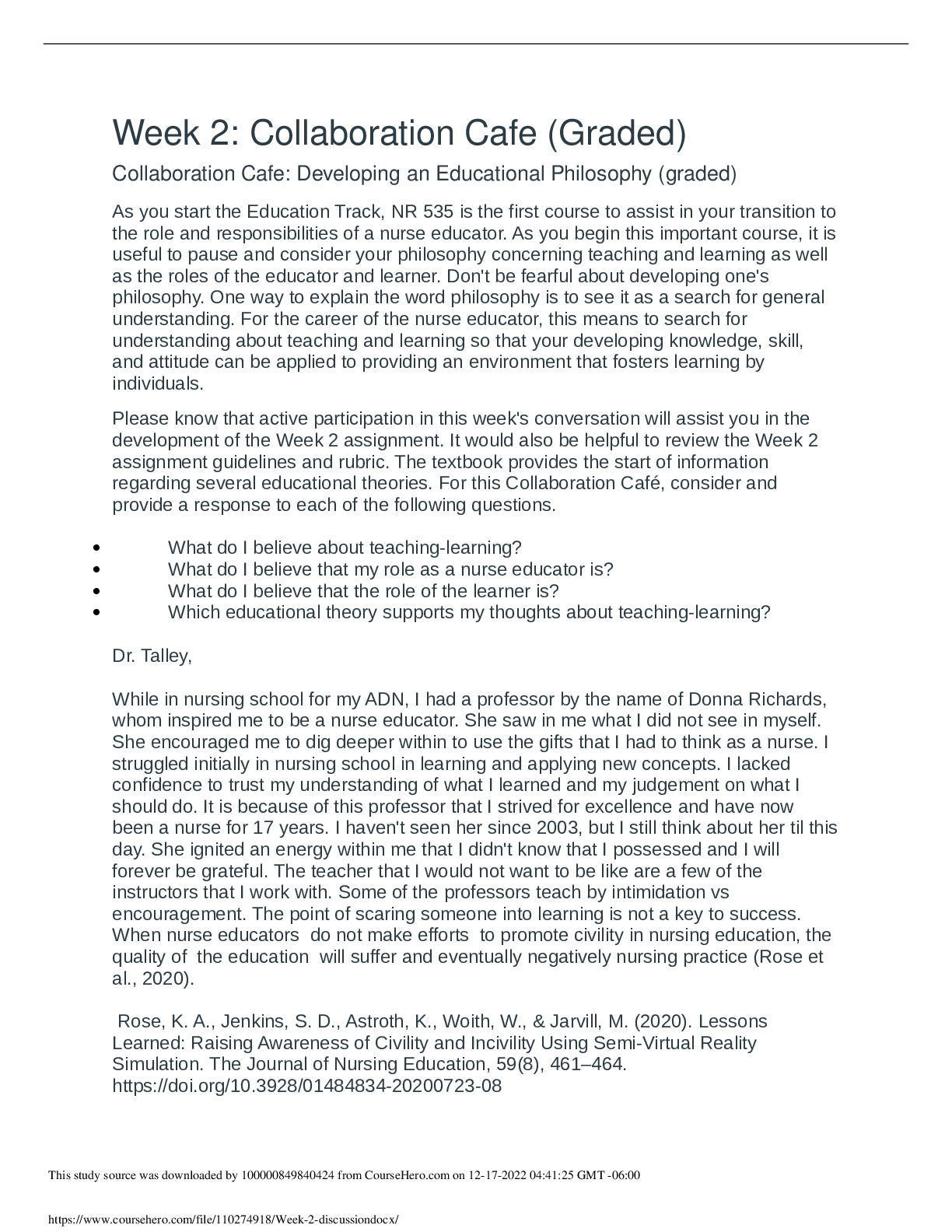
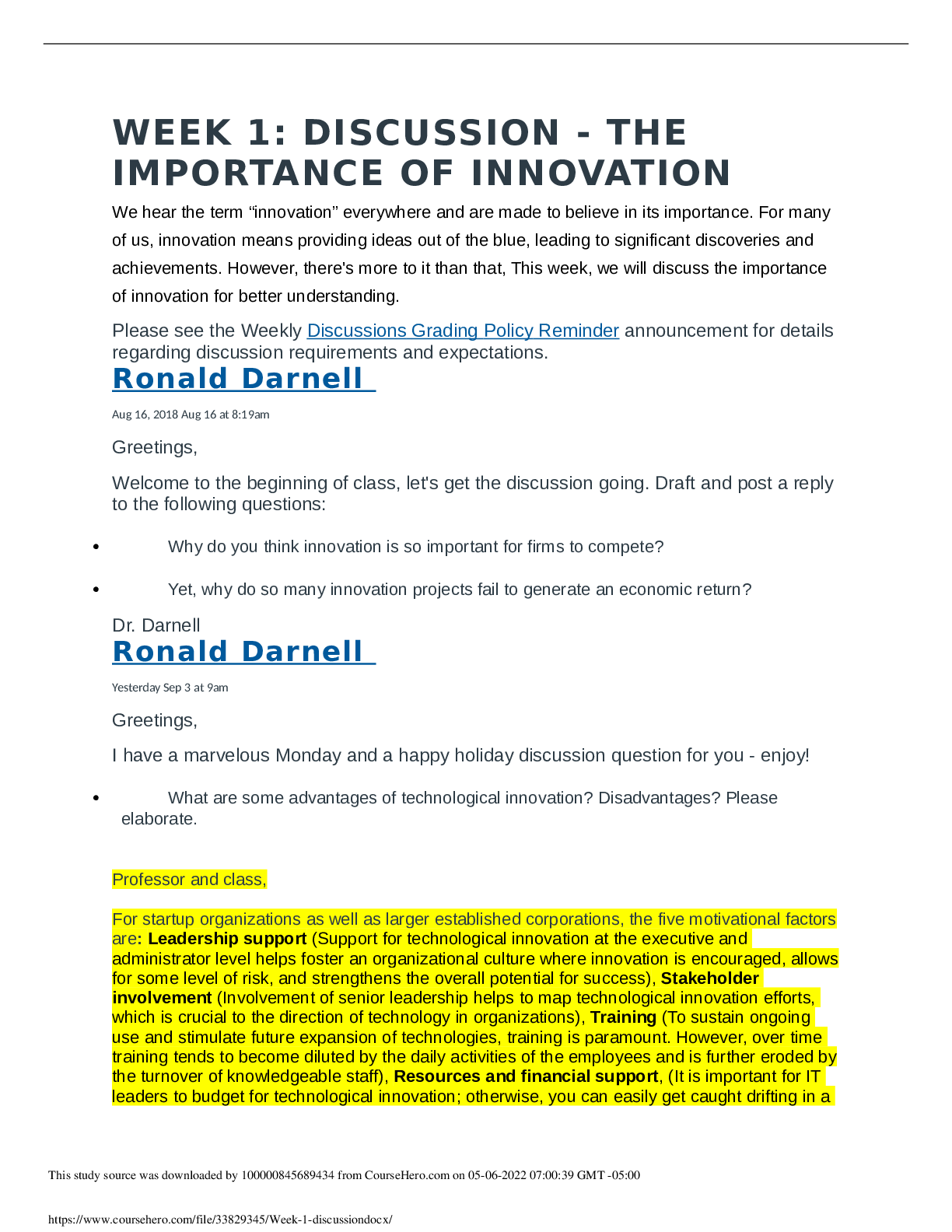
.png)

.png)
.png)

.png)
.png)

